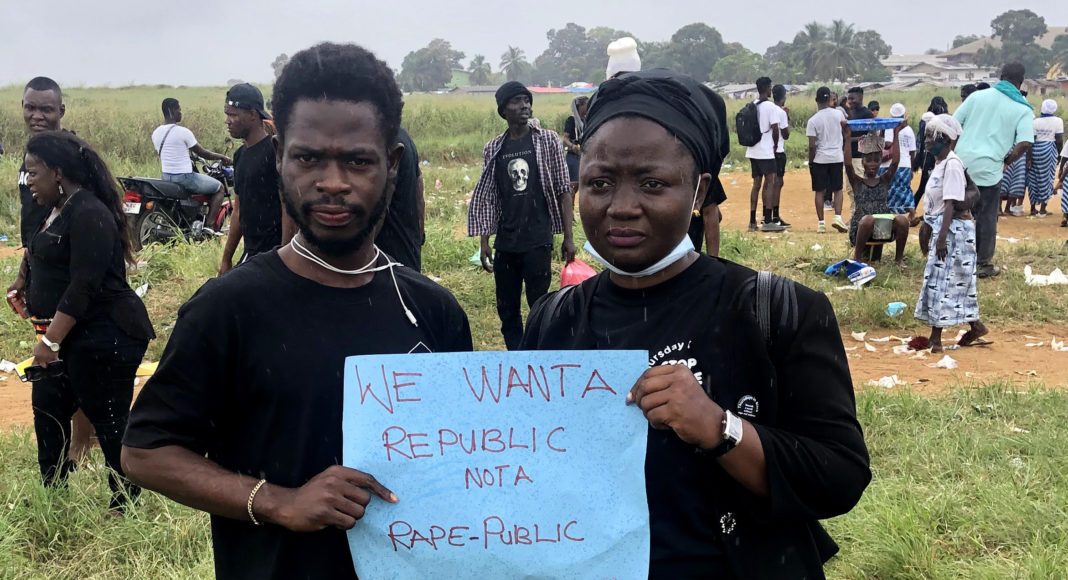By Dounard Bondo
GBARPOLU COUNTY, Liberia – Liberia’s senatorial elections elections did not take place as planned on December 8 in Nomodatonau town, Gbapolu county, because the town chief had seized ballot boxes and other election materials.
When Botoe Kanneh, the lone female senatorial candidate in the lead, entered the town on December 13th, two days before the first proposed re-run, she could not have known the danger that was facing her and her supporters. The town chief ordered the release of the Poro society masquerade, a secret traditional society exclusive to men. As per tradition, only initiates of the society are allowed to see the Poro masquerades (known locally as “country devils”), ensuring that women voters couldn’t come out.
Men in Nomodatonau town beat Kanneh and her supporters and at least one of her supporters was raped while in police custody, according to a coalition of women’s groups. The December 15 rerun was thus cancelled by the national electoral commission.
Many women’s organizations have condemned these horrific crimes, and the justice department has launched an investigation of the events. The elections in Gbarpolu county were re-scheduled for January 7, and Kanneh is projected to win the seat.
The horrendous events in Nomodatonau highlight Liberia’s rape epidemic as well as the severe challenges women face in their quests for political office. Men deprived women of the right to vote in Liberia until 1946, almost 100 years after Liberia’s independence. Many hoped the election of Ellen Johnson Sirleaf as Liberia’s and Africa’s first female president in 2006 would spark a new wave of women’s representation in politics.
In 2005, during her first term, 13 women were elected to the legislature and six women were appointed amongst her 22 cabinet members. In reality, while limited progress was made under Sirleaf’s government, there is still a glaring lack of women’s representation in Liberia.
Under current President George Weah, who was elected in office in 2017 and who has declared himself “feminist in chief,” only three of 19 ministerial appointees are women, and men occupy most deputy and assistant minister positions. In the Liberian House of Representatives, women only represent 8 out of 73 seats, and there is just one Liberian woman senator out of 30 seats.
One of the reasons behind the representation problem is women’s lack of access to adequate political platforms. The strength of a political party plays a pivotal role during elections, as major political parties provide reach and funding to their candidates. However, major political parties favor male candidates on their electoral tickets.
During the 2020 December senatorial elections, the president’s party, the Coalition of Democratic Change, did not field any female candidate, a decision that drew criticism from opposition parties. Socio-cultural traditions that are largely patriarchal and violence against women in elections discourage women from seeking political office.
A lack of women’s representation in government means that many women’s issues in Liberia go unaddressed. Despite rising rape cases, to which activists responded with a 3-day protest against rape in August 2020, rape didn’t feature as a main talking point during the elections. The president’s policy promises to address rape after the anti-rape protests have been largely unimplemented. In 2017, a predominantly male senate voted to make rape a bailable offense. Moreover, Liberia remains one of the few countries in the West Africa where female genital mutilation is still legal.
There have been several propositions to address the issue of representation of Liberian women. In 2016, the legislature concurred on the Affirmative Action for Equitable Participation and Representation bill, which sought to reserve a quota of fifteen seats in the legislature for women and other minority groups. However, despite having concurred with the bill, the House of Representatives sought to reduce the seats to seven. The bill was sent to a legislative committee to reconcile the differences in the quota number and discuss its implementation. In the end, the bill never made it to the president to be signed into law.
The election laws also encourage political parties to “endeavour to ensure” that women constitute at least 30 percent of its candidates. However, the law is not enforced and it is clearly not a requirement for political parties.
Even though women constitute a significant percentage of the voting population, there is minimal growth in the number of women vying for public office. With the projected victory of Botoe Kanneh, there are renewed hopes that women’s representation will take an upward curve.

